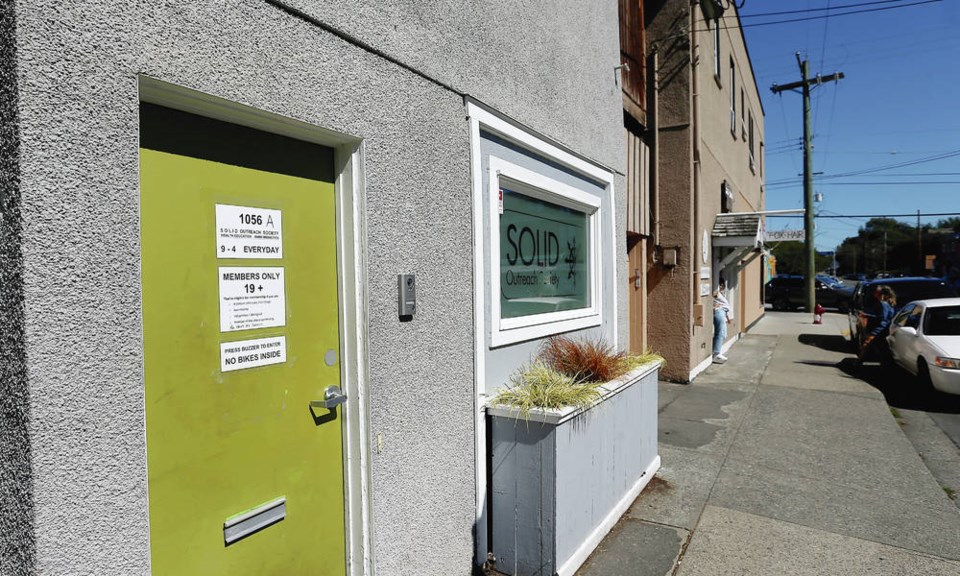A group that provides harm-reduction and advocacy for drug users is applying for a rezoning that would allow it to legally give out free cannabis to help people reduce their opioid use and alleviate withdrawal symptoms.
SOLID Outreach Society is applying for a three-year temporary-use permit for its sites at 1056 North Park St. and 1802 Cook St. to continue the overdose-prevention pilot project.
The service, available seven days a week, involves providing cannabis daily to people who qualify as members, who use hard drugs and are on income assistance, said Fred Cameron, operating manager at SOLID.
He said cannabis helps to improve members’ general health by easing sleep problems, settling the stomach to increase appetite and reducing anxiety.
“We’re like a godsend. Many of our membership can’t afford to go anywhere else,” Cameron said.
Mark Willson, SOLID’s director of programs, told city council in a letter that there is promising evidence that cannabis substitution can help reduce the risk of illicit-drug overdoses for those most at risk, and improve health and well-being for members who use the program.
Willson said rejecting the organization’s application might drive people to use illicit street drugs for relief “of psychic and physical pain.”
SOLID has been providing cannabis to opioid users since December 2017, according to a report by researchers who have been working with the organization to evaluate the program’s effects.
Researchers at the University of Victoria’s Canadian Institute for Substance Use Research analyzed responses by 172 participants in 2018, and found that cannabis recipients cited a range of improvements to their health, including reduced use of other drugs, better sleep and better pain management.
Some participants said they stopped using other drugs entirely, while others noted only a minimal reduction in their use of hard drugs, the report said.
“Over the years, I have pretty much tried everything under the sun. My main choice is crystal meth and weed. But since starting the program, my meth use has gone way down to nothing,” one participant is quoted as saying. Some noted a significant reduction in their use of alcohol and painkillers, because they were feeling less pain, the report said.
The pilot project has attracted the interest of Island Health’s chief medical health officer, who submitted a letter to council in support of SOLID’s rezoning application.
“They have gained experiential knowledge on using cannabis, a now legal product in Canada, as an alternative to opioid substitution that successfully addresses withdrawal, pain management, and at times replaces the ingestion of opioids,” Dr. Richard Stanwick said.
Island Health can only work with SOLID on the project, exploring the potential benefits of cannabis to reduce overdoses, if the organization complies with municipal zoning legislation, he said.
Stanwick said the number of overdoses and overdose deaths remains “unacceptably high,” despite efforts by health-care workers, people with lived experience and politicians to curb the crisis.
Almost 6,000 people have died of a drug overdose in B.C. since 2015. The province declared a health emergency in 2016 that is still in effect.
A staff report headed to council today recommends supporting the rezoning proposal, because it’s temporary and “the substitution of cannabis for opioids could help address problematic substance abuse.”
The report also notes that SOLID has agreed to continue having “a street ambassador,” who regularly walks the block outside its building to discourage people who use their services from congregating on the sidewalk.
Made up of current and former illicit-drug users, SOLID provides services out of its buildings at the corner of North Park and Cook streets. The current commercial zoning allows its existing harm-reduction services, such as access to clean needles, safe disposal of used needles and a street-cleaning team, but it does not allow the organization to provide cannabis.
The organization would need to be zoned as a storefront cannabis retailer to distribute cannabis, unless council approves the temporary-use permit. There is another address zoned as a storefront cannabis retailer just 37 metres away, which is too close for the city’s 400-metre limit, but city staff note in the report that it does not have a provincial licence and doesn’t appear to be open.
City staff have recommended that council consider granting the temporary-use permit, because SOLID’s program is a harm-reduction service, rather than a for-profit cannabis dispensary.
However, Harold Stanley, co-chair of the North Park Neighbourhood Association’s land use committee, said the association is concerned about a growing concentration of services in the area for people who use drugs or are homeless. He said the area also has a concentration of stores that sell cannabis paraphernalia.
Stanley said residents have reported an increase in break-ins and crime that they believe to be correlated with SOLID opening in the neighbourhood.
The neighbourhood association has drafted a letter to council suggesting it would prefer a shorter permit that would allow SOLID to continue operating while looking for a new location for its services, Stanley said.
He said the association recognizes and supports the social benefit SOLID provides, but the number of services in the area is becoming unsustainable for many residents.
“It’s getting to a point where the concentration is just too much, and some of these services have a clientele that is city-wide, not just concentrated in North Park,” he said.
Cameron, however, said the population SOLID serves was already in the neighbourhood.
“SOLID didn’t bring this here. You know, we entered the area where the drug use was the highest in the city,” he said.



